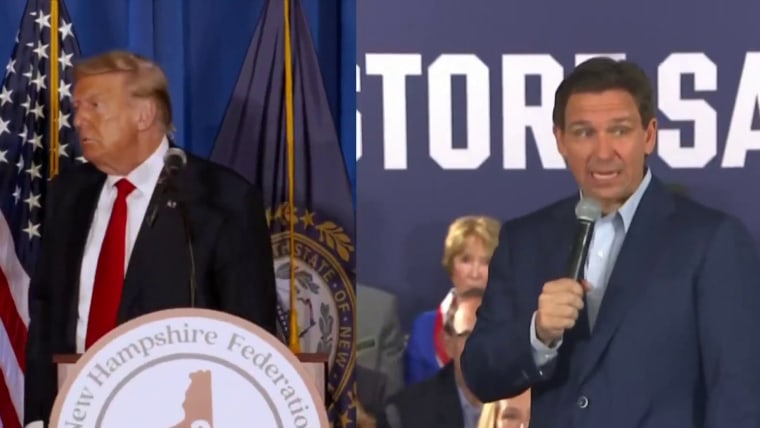Ron DeSantis vetoes popular criminal justice bill as he moves to Trump’s right
“The legislation had near universal support and was sponsored in the state House by a DeSantis supporter, who told NBC News he's "disappointed."

TALLAHASSEE, Fla. — Gov. Ron DeSantis issued a surprise veto Tuesday, rejecting a popular criminal justice reform bill that had received overwhelming bipartisan support in the state Legislature.
The move amplified his efforts to move to the right of former President Donald Trump on a range of issues, including on crime prevention.
Criminal justice has become a hot topic in the 2024 presidential campaign in recent weeks. Last month, DeSantis told conservative pundit Ben Shapiro that, if elected to the White House, he would try to repeal Trump's First Step Act, a law aimed at lowering recidivism rates.
DeSantis’ campaign has also tried to spotlight his hard-line approach to fighting crime by taking a trip to San Francisco to show the Democratic stronghold’s struggles, and this week, he said he would use “deadly force” against suspected drug traffickers trying to break through barriers at the southern border.
DeSantis voted for an early version of the First Step Act as a member of Congress, but during his time as governor and now a presidential candidate, he has honed a message much more in line with hard-line conservatives who have generally opposed policies that could be perceived as soft on crime.
The latest example came Tuesday night when he vetoed legislation that would allow adults to expunge their criminal record — even if they previously had their record expunged as a minor — which is not allowed under current Florida law. The proposal, HB 605, would open up the opportunity only to people who had charges dropped, were found not guilty or were arrested but not ultimately charged.
The bill was sponsored in the Florida House by Republican state Rep. David Smith, who has endorsed DeSantis’ presidential bid. Smith said he was “disappointed” by the governor's move.
“I was not provided any reason for the veto," Smith told NBC News. "However, his senior staff has expressed to me a willingness to work on the bill language before the 2024 legislative session with the expectation it could be signed into law next year.”
He said he is not reconsidering his presidential endorsement of DeSantis because of the veto, even though it’s the second time he has had a criminal justice reform bill vetoed by the governor. The other was a 2021 bill that proposed allowing the expungement of juvenile criminal records for those who went through a diversion program.
One year later, DeSantis signed a version of the bill that did not include "forcible felonies."
Criminal justice groups who supported the bill that was vetoed Tuesday were surprised because it had passed with unanimous support in the Florida Senate, and only two “no” votes in the House.
“Expungement is not a ‘soft on crime’ policy,” said Christian Minor, a Florida lobbyist who was directly involved in advocating for the bill’s passage. It “would have afforded Floridians never convicted of a crime the opportunity to expunge their records and go on to lead a life of success and become tax-paying citizens.”
In a departure from the norm, DeSantis did not offer any explanation in his veto message Tuesday night. His office did not respond to a request seeking comment.
Some of the governor’s advisers, however, said the move was consistent with the message he wants to send as a tough-on-crime presidential candidate.
“Gov. DeSantis has always been a law and order leader. While well-intentioned, he seems worried about the ratification of a more lenient view on criminal records,” one adviser familiar with his thinking said.
"The California and Soros prosecutor’s view is not what he wants for Florida," the person added, referring to the liberal billionaire George Soros, who has been backing progressive prosecutors in elections all over the country.
Another DeSantis supporter said signing the bill into law could have sent mixed signals and opened “him up to criticism since he’s been vocally against Trump’s First Step Act.”
In May, DeSantis signed legislation allowing for the death penalty for child rapists, a move that was part of a larger criminal justice reform package passed by GOP lawmakers at his urging. It also lowered the number of jurors needed to recommend the death penalty, from 12 to eight.
As a 2024 presidential candidate, Trump has had something of an uncomfortable relationship with the reforms he implemented while in office.
In an interview last week, Fox News' Bret Baier brought up the First Step Act. The former president pointed, as he has in the past, to a woman named Alice Johnson. As president, Trump granted her clemency and early release from prison after she was convicted of a nonviolent drug crime.
Baier pressed Trump on the fact that Johnson could be killed under a proposal he has now put forward to make drug dealers eligible for the death penalty.
Trump seemed confused about the details of his current plan and then concluded simply that Johnson "would not have done" that crime because extending the death penalty to drug dealers would be a deterrent.
A Trump spokesman did not immediately return a request for comment.
Former Florida state Sen. Jeff Brandes, a Republican who focused much of his efforts on prison reform while in the Legislature, said Florida-based criminal justice reformers have struggled to see eye to eye with DeSantis for years.
“The criminal justice community struggled to find hope, but persevered because this issue affects their friends, family and loved ones,” he said. “Florida continues to have more than 12,000 pending clemency cases, the National Guard still patrols our understaffed prisons, and Florida has still yet to adopt policies that reduce inmate idleness or provide second chances.”
“We pray daily that God will soften his heart, and show him that justice must be tempered by mercy,” he added of DeSantis.
Jenna Bottler, president and executive director of the Justice Action Network, the nation’s largest group working on bipartisan criminal justice reform, says that since he announced his presidential bid, she has seen a change in DeSantis, who previously had signed some policies she supported.
“Before launching his presidential campaign, Gov. Ron DeSantis and overwhelming bipartisan majorities of the Florida Legislature were aligned with the Republican Party and red states across the country: They saw a criminal justice system failing to efficiently protect public safety, all while failing to wisely use taxpayer dollars,” she said.
“Unfortunately, just in the last few weeks, we have seen rhetoric out of the campaign that is out of step with Republican voters and Gov. DeSantis’ own track record on these issues,” she added.“

No comments:
Post a Comment